Promoting international research mobility and creating international talent circulation is an essential condition for robust research and development. To this end, it is important to internationalize the research ecosystem, promote international human resource exchange, and ensure that Japan is firmly integrated into the international brain circulation network. Under this special topic, we will introduce the current status and challenges of Japan's research efforts to promote international brain circulation to produce outstanding research results as well as the attractiveness of Japan's research environment, which is the key to attracting foreign researchers, through a series of interviews with relevant people in the field. In this interview we spoke to Dr. Rudder Wu, Senior Researcher at the National Institute for Materials Science (NIMS).
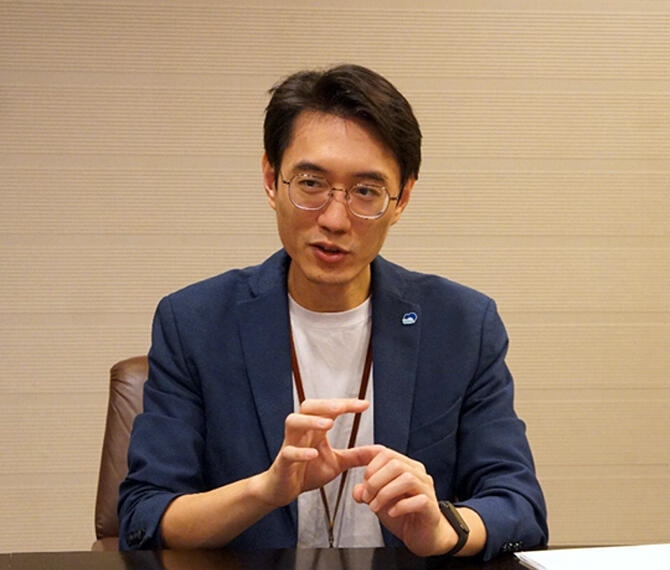
From Taiwan to Canada, the U.K., and now Japan
Dr. Rudder Wu was born and raised in Taiwan and emigrated to Canada with his family after graduating from junior high school. Heightened tensions between Taiwan and China served as the backdrop to this move. After graduating high school with excellent grades, he attended the University of British Columbia (UBC), one of the top-ranked universities in Canada. He chose this university because it was located on the West Coast, near his home, and relatively close to Taiwan geographically. After entering university, he spent every day fully immersed in his studies.
"More than 60% of the students at the university were of Asian origin. Each year, approximately 40% of the students, who had poor grades, had to repeat the year. Because of the fierce competition among students, I was unable to enjoy any school club activities and spent every day studying. About 48 students had enrolled in the Materials Engineering course, but only a dozen or so graduated."
His first visit to Japan was accidental. In 2002, Wu happened to go to see Professor Roger Reed in his office to ask him a question after class. He had just received a call from a colleague at NIMS who was looking for a student for an internship. He proceeded to ask him about the topic discussed in class, and was told, "I have been using this material for 10 years, but this is the first time that a student has pointed out a mistake." This led to the opportunity to come to NIMS as an intern student.
At NIMS, his eight-month internship was at the research center of Dr. Hiroshi Harada (currently Senior Scientist), who had worked with Prof. Reed at Cambridge University. After completing his undergraduate program, with First Class Honours, Wu went on to Imperial College London in the U.K., where Professor Reed had been transferred. He obtained his Ph.D. there. In 2009, he joined the International Center for Young Scientists (ICYS) in NIMS as a fellow.
"At the time, having applied to several institutes including NIMS and German government research institutes, I received offers from four countries: the U.K., Germany, Canada, and Japan. It has been said that "The 21st century is the age of Asia," and I had always wanted to return to Asia one day, so I decided to go to ICYS at NIMS. ICYS is considered the best institution in Japan for postdoctoral fellows, and most fellows here have postdoctoral experience from different universities and research institutes before joining ICYS. At the time, my case was the first one of joining ICYS immediately after graduation. After working at ICYS for about two and a half years until 2011, I was hired as a permanent researcher at NIMS."
During his time at ICYS, the Great East Japan Earthquake occurred. While many overseas researchers at NIMS returned home temporarily or permanently, he stayed at NIMS the whole time. During this time, he broadcast important information about radioactivity levels and others in English and Chinese on the radio. Afterwards, he was awarded a letter of appreciation to his contribution from the Japan International Science and Technology Exchange Center (JISTEC), a public interest group corporation.
Immersed in materials engineering
Wu had a strong interest in materials engineering since the time he entered UBC.
"I thought that the radically changing R&D environment would after all need to focus on materials and ingredients as the basis for making major discoveries. In particular, I have always been interested in thermal insulation materials," Wu recalls.
"The lead time for the development of new technology is very long, and it can take from five to ten years before you can actually make a contribution to society. Moreover, unless actually adopted, technology cannot contribute at all. At present, companies are embracing ESG (Environment, Social, and Governance) strategies and setting targets to reduce carbon dioxide (CO2) emissions by reducing energy use and other measures. To quickly achieve these goals, introducing new technologies is of vital importance, but above all, the current amount of electricity being consumed has to be reduced. Insulation is very critical in this regard. With the use of quality insulation, a 20−30% reduction in electricity consumption can be easily realized. Since the establishment of our startup, we have received many inquiries, most of which were related to reducing electricity consumption in factories and other facilities. Through my research on insulation, I feel that there is a strong possibility to contribute to society."
Startup founded with a newly developed material, TIISA®
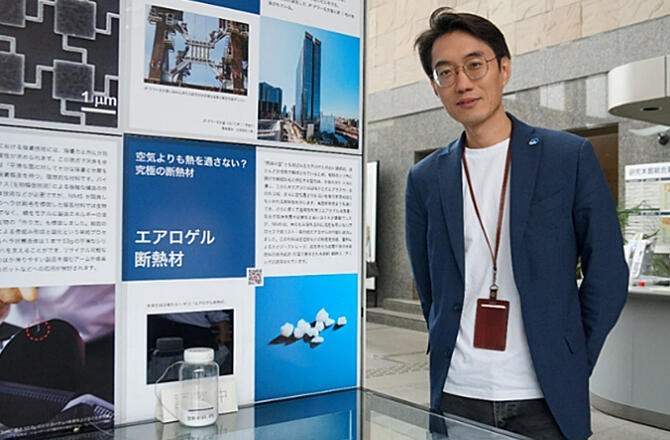
In 2011, when Wu was hired as a NIMS permanent researcher, then President Sukekatsu Ushioda recommended that he look for a new theme to expand his potential as a young researcher. Wu spent a total of two years at the Swiss Federal Laboratories for Materials Science and Technology (EMPA) in Switzerland, a government-affiliated and sister institute of NIMS, on three separate occasions to conduct R&D on insulation materials. After returning to NIMS, based on the knowledge he gained at EMPA, and incorporating his original ideas, he developed a core technology for super-insulating materials named TIISA® (Thermal Insulation Inflatable-Solid-Air) and applied for a patent.
"While metals are known to have higher thermal conductivity than water, elements such as carbon, silicon, and iron have different thermal conductivity depending on their structure. Detailed calculations of the differences in thermal conductivity suggested that there were structure-specific limits in the material. We have succeeded in breaking through such limits by designing and creating a unique structure. An idea to drastically change the structure led us to success."
"Conventional insulation materials are solid and have a high porosity. Accordingly, their thermal conductivity is high. In the insulation material we have developed, each particle is finely granulated, and its surface is modified to be superhydrophobic, so that the particles don't come in contact with each other. This prevents heat transfer and improves insulation."
Based on this new material, TIISA®, Wu founded the startup "Thermalytica" in 2021 and became its CTO (Chief Technology Officer). In 2022, along with Japanese venture capital (VC) firms, NIMS invested in his company. The company is the 16th startup originating from NIMS and the first to be funded by NIMS itself.
"When I was trying to set up the company, other researchers were not interested in entrepreneurship, and I could not talk to anyone about it. Starting a business requires you to learn a lot, and you also need to raise funds and prepare a business plan. No one will invest in your company unless you create a clear and specific plan for IPO, listing on the stock exchange, or M&A. This was quite challenging for me indeed. Fortunately, then President Kazuhito Hashimoto decided to apply the cross-appointment system to startups, and under the leadership of the current President Kazuhiro Hono, the NIMS External Collaboration Division and the Human Resources Division have been supporting spin-off companies even more actively. I feel strongly supported by the whole of NIMS."
Thermal insulation paints using TIISA® have high insulation performance, and many outside companies inquire about them. While his company currently provides small quantities as samples, there are plans to begin full-scale production and sales soon. Furthermore, Wu is also developing Business to Business to Consumer (B2B2C) and Business to Customer (B2C) products using aerogel insulation materials.
"The age of heat is upon us. We feel that the need for developing new insulation materials is high and that opportunities exist for startup companies. This April, we were certified as a J-Startup by the Ministry of Economy, Trade, and Industry. We will also leverage the brand power of NIMS and J-Startup to develop a strategy for the development of high-performance insulation materials."
"In our next round of fundraising, we hope to invite foreign investors. Initially, we were told that inviting foreign investors would require going into the U.S. market. However, the situation has changed dramatically in the past six months, and now investment funds are increasingly flowing to Japan. The possibility of obtaining funds from the U.S. and other countries is increasing, while still being a Japan-based company." Wu's tone of voice conveys his strong passion for the future development of this startup.
"Manufacturing obviously continues to be an important industrial sector in Japan. However, the development of new core technologies and the acquisition of their intellectual property (IP) is more vital. Manufacturing costs in Japan cannot compete with those in China, Taiwan, Southeast Asia, and elsewhere. I think the business model of pursuing R&D, working to obtaining IPs, and leaving the manufacturing to other countries is the right strategy."
Regarding International Brain Circulation
Looking at Wu's background and track record, he seems to embody the concept of international brain circulation. We asked him about the research environment in Japan.
"I feel that the environment of Japanese research institutions has become quite internationalized. The use of English has progressed significantly at NIMS compared to the time when I first came to Japan for my internship, in 2002. However, since the official language here is Japanese, some obstacles remain. I don't think internationalization here will ever reach the level of Singapore."
"I believe that many foreign researchers and students in Japan consider their research here as one step in their career and intend to return to their own countries eventually. I myself would have most likely gone somewhere else if I had not been able to launch a startup here. While basic research is indeed important, I am more interested in applied research. I have a strong aspiration to contribute to society with the results of my hard work at NIMS over 5 or 10 years. When I applied for the position of permanent researcher at NIMS, I dared to advance such visions and even expressed my honest opinion that if I couldn't do it, I might go somewhere else, and I got a position."
So, what should be done to internationalize the research environment in Japan and attract outstanding foreign researchers?
"From the perspective of researchers coming from overseas, the prospect of simply carrying on as a researcher in Japan may not always be sufficiently attractive. On the extension of research, I think it is important to be able to work toward the 'goal' of using research outputs to establish new startups and contribute to society."
"I think it would be a good idea to actively communicate to foreign researchers that Japan's research ecosystem, including OIST (Okinawa Institute of Science and Technology) and other national research institutes, now facilitates not only research, but also entrepreneurship. There is the possibility to conduct research in Japan and use the results to start a business, which would provide a great sense of accomplishment. I believe it is very important to communicate these messages."
Goodwill toward Japan
Wu feels that "tailwinds" will be blowing in Japan from now on and that there will be opportunities to draw more researchers from overseas. As reasons for this, he cited the safety and security in Japanese society and the quality of the environment.
"In Europe, the U.S., and elsewhere, destabilizing factors in society are now on the rise. When you think about the trends in Asia or other parts of the world, Japan is maintaining a safe and stable society relatively well. With such advantages, Japan will receive more and more tailwinds in the years to come."
When asked to give some advice or a message for people overseas who are interested in Japan, Wu said, "I would recommend that researchers should come to Japan. The main reasons are in the positive aspects of living, social safety, family life, children's education, and the environment. As for the research environment, although researchers who cannot speak Japanese are a bit at a disadvantage, I believe that the adoption of Grants-in-Aid for Scientific Research (KAKENHI) from the Japan Society for the Promotion of Science (JSPS) is sufficiently fair. If foreign scientists find this unfair, they will return to their own countries. Japan is moving into the age of entrepreneurship, and many young people are starting their own businesses right after graduating from university. I believe that Japan will get even better from now on. I would strongly recommend people from overseas to come to Japan."
Wu says that he loves Tsukuba, where NIMS is located. "Tsukuba is a very nice place. There is a very good balance between research and personal life. With no air pollution, you can enjoy the environment, where you can concentrate on your research. There are also many bars, Izakaya, and other interesting places to visit. Close proximity to Narita Airport makes it convenient for traveling abroad. With the concentration of human resources and infrastructure, I feel that the potential is there for cutting-edge off-shore companies to move into the region."
After the interview
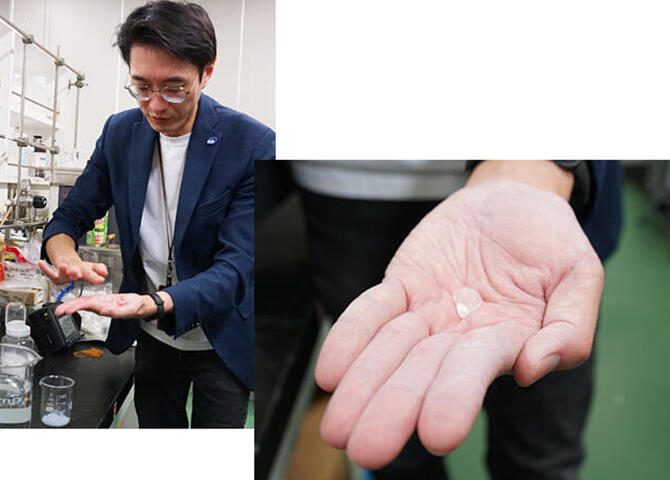
Our interview, during which Wu answered enthusiastically in fluent Japanese, went well beyond the scheduled time. After the interview, he graciously agreed to our request for a brief visit to his laboratory. His laboratory, which can't quite be described as newly renovated or luxurious, is located in a corner of the research building, a short distance from the interview location. It is also the headquarters of his startup.
In the lab, Wu demonstrated the powerful water repellency of the insulating material he developed (TIISA®) by smearing it on the palm of his hand.
Wu, who has experience in founding a business while in high school in Canada, is all the more passionate when he talks about his startup. His positive attitude toward everything, including the prospects of his company, and his proactive and sincere approach to everything he does is very impressive. We look forward to his continued success.
(The interview held on June 23, 2023, at NIMS in Tsukuba, Ibaraki)
Interviewer Yoshihiro Higuchi
Director for Global Strategic Issues, Japan Science and Technology Agency (JST)
(Editor of the original article in Japanese:
Nobuhiko Horiuchi, Chief Editor of Science Portal China)
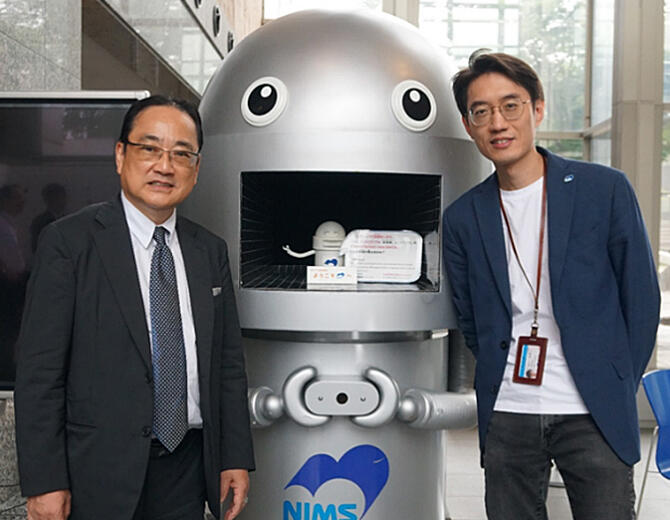
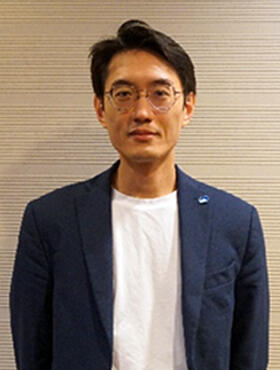
Profile
Rudder Wu
Senior Researcher, High Temperature Materials Group, Materials Manufacturing Field, Research Center for Structural Materials, NIMS.
CTO (Founder), Thermalytica Inc.
Areas of expertise: ultra-high-performance insulation materials, building insulation, and thermal barrier coatings.
<Overviews of NIMS>
Designated National Research and Development Institute, National Institute for Materials Science (NIMS) NIMS aims to improve the level of materials science and technology by conducting in a comprehensive manner fundamental and basic research and development related to materials science and technology.
NIMS homepage: https://www.nims.go.jp/eng/index.html
Produced by the Science Japan Editorial Team




